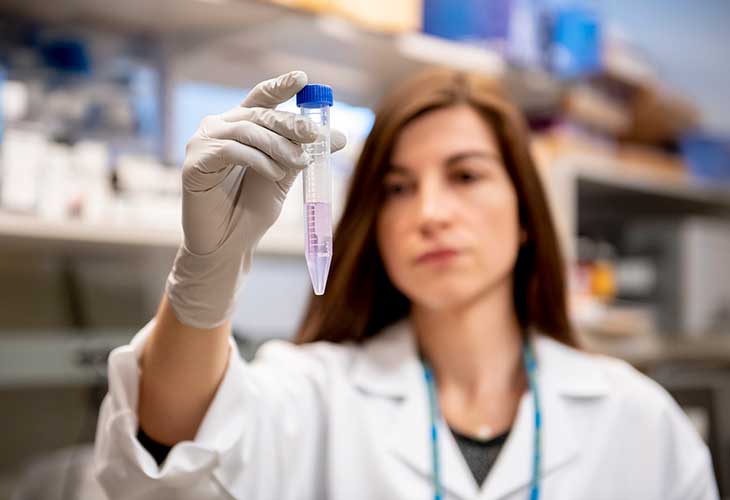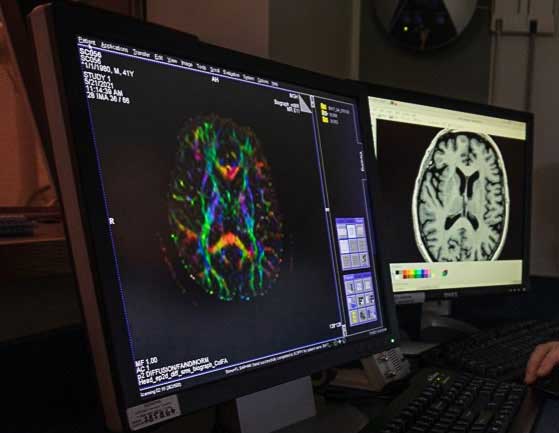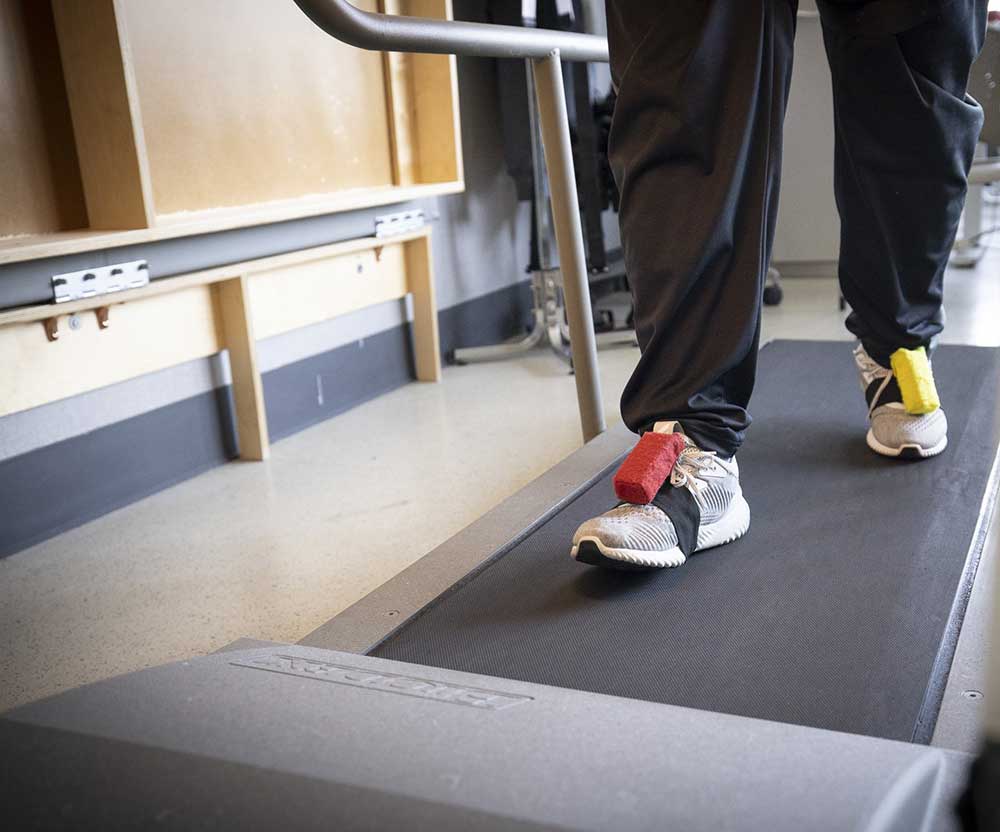Scott Schoen and Nancy Adams Discovery Center for the Recovery from Chronic Pain
 Chronic pain is a debilitating condition that affects the lives of more than 1.5 billion people worldwide — almost 100 million American adults alone. There are more new cases of chronic pain among U.S. adults than other long-term conditions like diabetes, depression, and high blood pressure, and it is the most prevalent reason why Americans seek health care. Traditional methods for treating chronic pain are often palliative, fostering unhealthy opioid dependencies rather than addressing the root of pain directly. The Scott Schoen and Nancy Adams Discovery Center for the Recovery from Chronic Pain is dedicated to developing and testing a variety of creative strategies for pain management and narcotic reduction, including open-label placebos, virtual reality, non-invasive brain stimulation, acupuncture, and psychedelics. Philanthropy supports the innovative studies of our team, which often require more non-traditional modes of funding.
Chronic pain is a debilitating condition that affects the lives of more than 1.5 billion people worldwide — almost 100 million American adults alone. There are more new cases of chronic pain among U.S. adults than other long-term conditions like diabetes, depression, and high blood pressure, and it is the most prevalent reason why Americans seek health care. Traditional methods for treating chronic pain are often palliative, fostering unhealthy opioid dependencies rather than addressing the root of pain directly. The Scott Schoen and Nancy Adams Discovery Center for the Recovery from Chronic Pain is dedicated to developing and testing a variety of creative strategies for pain management and narcotic reduction, including open-label placebos, virtual reality, non-invasive brain stimulation, acupuncture, and psychedelics. Philanthropy supports the innovative studies of our team, which often require more non-traditional modes of funding.
Paula Ness Speers and Mark Speers Discovery Center for Spinal Cord Injury Recovery
Each day, more than 30 people in the U.S. sustain a spinal cord injury (SCI) that results in paralysis. More than half of these individuals lose the function of both their arms and legs. Health issues associated with inactivity are compounded for people with SCI — the risk of diabetes doubles; the risk of heart disease triples; and the risk of stroke quadruples. The mission of the Paula Ness Speers and Mark Speers Discovery Center for Spinal Cord Injury Recovery is to uncover new ways to maximize mobility, function, health, and quality of life in people with SCI. Our researchers are exploring groundbreaking concepts like whole-body exercise, intermittent oxygen deprivation, and neural stem cell transplantation, and are uncovering ways to combine therapies to boost their beneficial effects. Donor support helps these pioneering investigators translate their discoveries into tangible and transformational advances for improving the lives of people with SCI.
Discovery Center for Brain Injury and Concussion Recovery
 Acquired brain injury is the second most prevalent disability in the U.S., affecting almost 13.5 million Americans. Spaulding’s Discovery Center for Brain Injury and Concussion Recovery is dedicated to uncovering new and improved therapies to optimize recovery, productivity, and quality of life for patients with all forms of brain injuries, from mild to traumatic. Researchers at this pioneering center are investigating innovative approaches in robotics, imaging, genetics, biomarkers, and neurostimulation — both independently and in concert—to inform and improve treatments throughout the care spectrum. Philanthropic funding will enable us to recruit an exceptional scientist to lead the center as well as advance our pioneering investigations.
Acquired brain injury is the second most prevalent disability in the U.S., affecting almost 13.5 million Americans. Spaulding’s Discovery Center for Brain Injury and Concussion Recovery is dedicated to uncovering new and improved therapies to optimize recovery, productivity, and quality of life for patients with all forms of brain injuries, from mild to traumatic. Researchers at this pioneering center are investigating innovative approaches in robotics, imaging, genetics, biomarkers, and neurostimulation — both independently and in concert—to inform and improve treatments throughout the care spectrum. Philanthropic funding will enable us to recruit an exceptional scientist to lead the center as well as advance our pioneering investigations.
Discovery Center for Musculoskeletal Recovery
More than 126 million Americans — one in two adults — struggle with musculoskeletal conditions, and nearly one in five health care visits are bone, joint, or muscle related. These afflictions, which seldom make headline news, can compromise the body’s anatomical structure, often restricting ordinary activities. In turn, diminished movement compounds musculoskeletal problems, leading to muscle atrophy, sleep disruption, and depression. At the Discovery Center for Musculoskeletal Recovery, our researchers are already furthering the field through leading-edge therapeutics and technologies, from groundbreaking orthobiologics, to state-of-the-art robotics to anti-aging pathways. Focused on moving pioneering research into the clinical setting, the Center builds on Spaulding’s proactive approach to musculoskeletal rehabilitation, which incorporates evidence-based diagnostics and therapies with trailblazing models for improving accessibility to sports and exercise. Philanthropy makes this dynamic work possible.
Discovery Center for Stroke Recovery
 Every 40 seconds, someone in the United States has a stroke. At the Discovery Center for Stroke Recovery, our innovative scientists are focusing on the long-term needs of stroke survivors, building new knowledge and testing novel strategies to advance patient recovery. Efforts of this groundbreaking Center include the exploration of biomarkers to maximize therapeutic response, sophisticated neuromodulation treatments, and state-of-the-art robotics and assistive technologies. To ensure that this type of science can continue at this breakneck speed, our top philanthropic priority is the recruitment of a new director to provide leadership and oversight of the research enterprise in this area.
Every 40 seconds, someone in the United States has a stroke. At the Discovery Center for Stroke Recovery, our innovative scientists are focusing on the long-term needs of stroke survivors, building new knowledge and testing novel strategies to advance patient recovery. Efforts of this groundbreaking Center include the exploration of biomarkers to maximize therapeutic response, sophisticated neuromodulation treatments, and state-of-the-art robotics and assistive technologies. To ensure that this type of science can continue at this breakneck speed, our top philanthropic priority is the recruitment of a new director to provide leadership and oversight of the research enterprise in this area.


 Chronic pain is a debilitating condition that affects the lives of more than 1.5 billion people worldwide — almost 100 million American adults alone. There are more new cases of chronic pain among U.S. adults than other long-term conditions like diabetes, depression, and high blood pressure, and it is the most prevalent reason why Americans seek health care. Traditional methods for treating chronic pain are often palliative, fostering unhealthy opioid dependencies rather than addressing the root of pain directly. The Scott Schoen and Nancy Adams Discovery Center for the Recovery from Chronic Pain is dedicated to developing and testing a variety of creative strategies for pain management and narcotic reduction, including open-label placebos, virtual reality, non-invasive brain stimulation, acupuncture, and psychedelics. Philanthropy supports the innovative studies of our team, which often require more non-traditional modes of funding.
Chronic pain is a debilitating condition that affects the lives of more than 1.5 billion people worldwide — almost 100 million American adults alone. There are more new cases of chronic pain among U.S. adults than other long-term conditions like diabetes, depression, and high blood pressure, and it is the most prevalent reason why Americans seek health care. Traditional methods for treating chronic pain are often palliative, fostering unhealthy opioid dependencies rather than addressing the root of pain directly. The Scott Schoen and Nancy Adams Discovery Center for the Recovery from Chronic Pain is dedicated to developing and testing a variety of creative strategies for pain management and narcotic reduction, including open-label placebos, virtual reality, non-invasive brain stimulation, acupuncture, and psychedelics. Philanthropy supports the innovative studies of our team, which often require more non-traditional modes of funding. Acquired brain injury is the second most prevalent disability in the U.S., affecting almost 13.5 million Americans. Spaulding’s Discovery Center for Brain Injury and Concussion Recovery is dedicated to uncovering new and improved therapies to optimize recovery, productivity, and quality of life for patients with all forms of brain injuries, from mild to traumatic. Researchers at this pioneering center are investigating innovative approaches in robotics, imaging, genetics, biomarkers, and neurostimulation — both independently and in concert—to inform and improve treatments throughout the care spectrum. Philanthropic funding will enable us to recruit an exceptional scientist to lead the center as well as advance our pioneering investigations.
Acquired brain injury is the second most prevalent disability in the U.S., affecting almost 13.5 million Americans. Spaulding’s Discovery Center for Brain Injury and Concussion Recovery is dedicated to uncovering new and improved therapies to optimize recovery, productivity, and quality of life for patients with all forms of brain injuries, from mild to traumatic. Researchers at this pioneering center are investigating innovative approaches in robotics, imaging, genetics, biomarkers, and neurostimulation — both independently and in concert—to inform and improve treatments throughout the care spectrum. Philanthropic funding will enable us to recruit an exceptional scientist to lead the center as well as advance our pioneering investigations. Every 40 seconds, someone in the United States has a stroke. At the Discovery Center for Stroke Recovery, our innovative scientists are focusing on the long-term needs of stroke survivors, building new knowledge and testing novel strategies to advance patient recovery. Efforts of this groundbreaking Center include the exploration of biomarkers to maximize therapeutic response, sophisticated neuromodulation treatments, and state-of-the-art robotics and assistive technologies. To ensure that this type of science can continue at this breakneck speed, our top philanthropic priority is the recruitment of a new director to provide leadership and oversight of the research enterprise in this area.
Every 40 seconds, someone in the United States has a stroke. At the Discovery Center for Stroke Recovery, our innovative scientists are focusing on the long-term needs of stroke survivors, building new knowledge and testing novel strategies to advance patient recovery. Efforts of this groundbreaking Center include the exploration of biomarkers to maximize therapeutic response, sophisticated neuromodulation treatments, and state-of-the-art robotics and assistive technologies. To ensure that this type of science can continue at this breakneck speed, our top philanthropic priority is the recruitment of a new director to provide leadership and oversight of the research enterprise in this area.